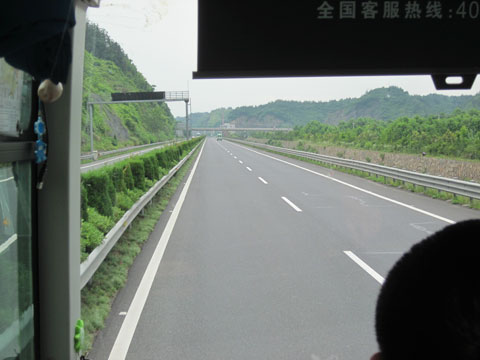
There are a few epic trips in my mind in which the road was better than the destination. I don’t mean that in the symbolic getting there is half the fun way (cause let’s admit it, train, buses and planes are a pain in the ass) but literally. Seeing what I saw on the road was just as interesting, if not more so, to the place I was going.
One such trip was from Germany to Italy which I wrote about here. The scenery the train passed by was amazing, beautiful and totally unforgettable. Like something out of a fairy tale. It doesn’t happen often.
But it happened again! We have a few weeks to kill between the end of the semester and a short 3rd semester, so we decided to take a quick trip to Yellow Mountain. One of the most famous mountains in all of China, it’s a mere 2 hours away, and yet we have never been. There is a direct bus and I wasn’t expecting much, just a long highway, but all I can say is wow.
Zhejiang is one of the most populated provinces, yet this road seemed to only pass by small villages and towns. Mountains followed us on both sides of the road. Not far away snow peaked mountains, but rather close, shorter mountains covered in bamboo. The weather lately has been very wet, and very humid, so everything was so lush and green you could almost hear it growing.

It looked like we had left China far behind and were driving through Switzerland instead. We passed these small villages dotted with little white houses that looked like they were nestled in the foothills of the Alps. (The only thing missing was church steeples.) The day was cloudy and a little gloomy, but as we passed by mountain after mountain these quick views of valleys, rice patties, small ponds and villages kept appearing and then quickly disappearing into the contours of the mountain.
Two days later (and one day before we were suppose to) we headed back after being hit by storm after storm after storm, unable to climb the mountain. (Spending four hours climbing a mountain in torrential downpour was not our idea of fun. We’ll come back again.) We went back on the same road, and yet the landscape had completely transformed.

It was no longer Switzerland, but all China, complete with rain soaked, wispy clouds clinging to the mountain-sides in an “ancient Chinese secret kind of way. It also had a slight South American rainforest feel, due to spontaneous waterfalls flwoing everywhere because of the rain. I wouldn’t have been surprised to see monkeys swinging from branch to branch feeding mangoes to their babies, or monks brandishing incense burners slowly chanting their way up the mountains disappearing behind a wisp of cloud.

Of course, all the changes from one day to the next was not good. While spontaneous waterfalls look cool from the dry safe bus, it’s not good for the people whose house is below said waterfall. When I say we experienced torrential downpour, I mean torrential downpour. In the city we stayed at, Yellow Mountain City, there were nerve-wracking signs of flooding everywhere (including a 100-foot long, 1.5 foot deep puddle at the entrance/exit of the bus station).

But the city seemed to get out of it easy compared to the countryside. Village after village was flooded and seemingly empty. Houses that resembled Swiss chateaus the day before were submerged under 10 plus feet of water. It was shocking to see, but as it turns out, common for the area. (In fact, many parts of China are experiencing floods after a long period of drought. You can read more here.)

Same road, different days. It’s amazing how quickly things can change.
Hit enter to search or esc to close


Those mountains are beautiful, and the images of flooding are frightening. I’m glad I never got caught in anything like that.
It felt so surreal because the highway was high, and not at all at risk, so it was “business as usual,” and yet we were passing these totally flooded out buildings and empty villages. Although a student later told me that when his hometown floods due to typhoons, they just stock up, move everything upstairs and try not to go out until the water has receded. Maybe that’s what these people were doing.